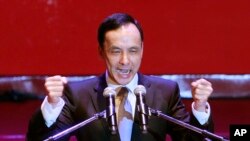Chinese tourists are being put off visiting Taiwan because of the "highly politicized" atmosphere there ahead of January's elections, a government spokesman said on Wednesday, but would not say if Beijing was telling people not to go.
Taiwan elections are always sensitive in Communist Party-ruled China, worried that the democratic winds from across the Taiwan Strait could cause people to wonder why their own government won't allow free polls.
China has made little secret of its dislike for the election frontrunner, Tsai Ing-wen from the opposition Democratic Progressive Party which has traditionally favored an independent Taiwan.
China considers self-ruled Taiwan, where defeated Nationalist forces fled in 1949 after losing to the Communists in the Chinese civil war, an integral part of its territory, and would consider a declaration of independence tantamount to war.
Chinese tourists have flocked to Taiwan since landmark economic deals were signed in 2008 as part of a thaw in ties, but Taiwan media has reported China will slash the number of tourists it allows to visit in the run-up to the election.
Asked if this was the case, An Fengshan, spokesman for China's Taiwan Affairs Office, said Taiwan was in a very "special and sensitive time" and implied Chinese tourists may be in danger if they went over the election period.
"The atmosphere in society has been highly politicized. Mainland tour groups will consider their own interests and tourists to Taiwan will consider the travel environment," An told a regular news briefing, carried live on state television.
"Looking at previous situations, these kinds of things have various levels of effect upon the desire of mainland tourists to visit Taiwan," he added.
China hoped for the stable development of tourism to Taiwan and that tourists' rights can be "paid attention to and guaranteed," An said. He did not elaborate.
Elections in Taiwan are raucous affairs but there is rarely violence and certainly not directed at outsiders.
Taiwan's government has said China will not radically cut the number of tourists it allows in around election time, but admits there may be some impact.





